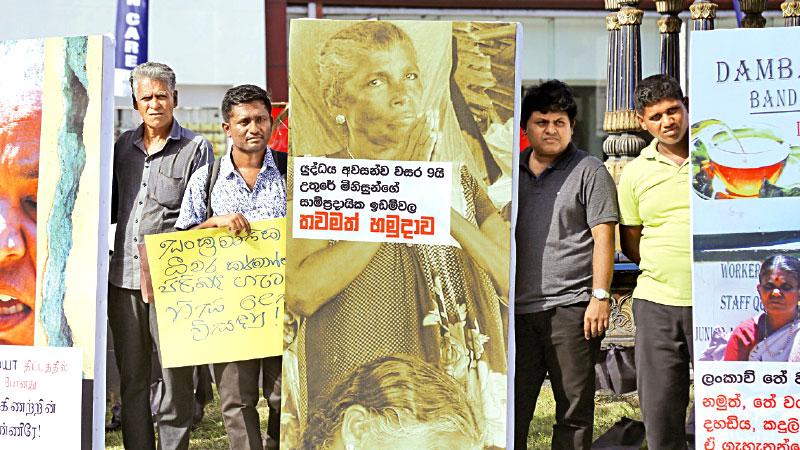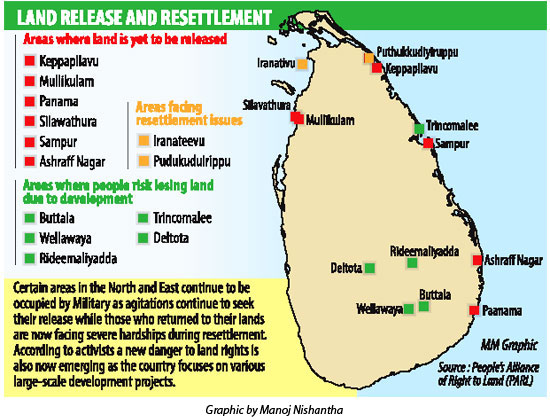
Nine years since Sri Lanka’s long drawn conflict, her people’s struggle for land continues. With certain areas in the North and East still occupied by the military after takeovers during the war, for some returning to their homes is yet a distant dream.
 Nevertheless, earlier this week five landowners were able to return after 27 years since fleeing their homes at the height of the conflict as the Sri Lanka Army released yet another 4.5 acres of land, located in the Kankesanthurai high-security zone. According to the Government, almost 89 per cent of the lands occupied by the Army in the North has now been returned to its rightful owners.
Nevertheless, earlier this week five landowners were able to return after 27 years since fleeing their homes at the height of the conflict as the Sri Lanka Army released yet another 4.5 acres of land, located in the Kankesanthurai high-security zone. According to the Government, almost 89 per cent of the lands occupied by the Army in the North has now been returned to its rightful owners.
Addressing complaints that the process of land release is too lengthy Major General Darshana Hettiarachchi, Commander, Security Forces – Jaffna, says, they must consider national security prior to releasing land, which therefore takes time. “The Army is committed to releasing as much of the land as possible,” he said adding that preparations are being made to release land on which Myliddy Maha Vidyalaya stands, on the instructions of President Maithripala Sirisena
He also assured that the Army is constantly assessing the situation in their efforts to release more land to the people.
Although the government has vowed to facilitate the return of land, around 300 landowners that gathered in Colombo on Tuesday has not been among the lucky few. With their lands in areas such as Panama, Mullikulam, Ashraff Nagar still under Government control they gathered on the day to air their grievances to the authorities and the public.
To these people, as activist Sandun Thudugala of People’s Alliance of Right to Land (PARL), says, the land is an issue of identity. “Their whole life is connected to their lands,” he says explaining that the loss of land is, in turn, the loss of identity to those affected.
Having engaged in livelihoods connected to their land, many are now faced with severe economic hardships with the women folk being those most affected. “Food security and debt are the other issues they have had to face as a result,” he says.
The protest on the day however not only sought to highlight the loss of land but also the problems faced by those who have eventually been allowed to return. Resettlement has become a daunting task as the loss of homes and livelihoods due to war has made living in these areas tough while government funds, as revealed have become insufficient to rebuild their lives.
However, the harsh reality is that not everyone whose land is occupied by the military or the Government will be able to return. With national security being a key concern some lands within the high-security zones and security sensitive areas will remain within state control.
Therefore, Major General Hettiarachchi says, the military has requested the Government to provide alternative land or compensation to those landowners according to current market value.
 While some claims of security concerns may be valid, however, Thudugala says certain victims feel the matter is being used as an excuse by the forces to retain land which has commercial value. For example the Navy, now running a hotel in Panama, Ampara on occupied land has heightened these doubts.
While some claims of security concerns may be valid, however, Thudugala says certain victims feel the matter is being used as an excuse by the forces to retain land which has commercial value. For example the Navy, now running a hotel in Panama, Ampara on occupied land has heightened these doubts.
He says, if the concerns regarding national security are genuine, all relevant authorities must have discussions with those affected. “Providing alternative land and compensation is not a final solution,” he says adding that the solution must be compatible with their lifestyles and livelihoods.
As those who lost their lands during the war are slowly gaining their ownership, activists say a new danger is emerging in the field of land rights. While following the end of the war the country has been on a development drive, many large-scale development related projects are now seen as a direct threat to land rights.
The government providing land in Rideemaliyadda to a Singaporean company to construct a sugarcane factory is one such example he points out.
With around 163 farmers in the area including other inhabitants set to become affected by the loss of land, the farmers in the area say the authorities took over these lands which they have been cultivating since the 1950s, in 2016 in order to allocate them for the sugarcane project.
Recently an alternative people’s tribunal was held in Bibila to discuss issues pertaining to land takeover. Speaking at the tribunal representing traditional inhabitants of the area, leader of the Rathugala Vedda chieftain Suda Wannila Aththo said the area now taken over and chosen for the sugarcane factory has been utilized by his tribe for over seven generations. “The impact it will have on the area will affect not only the Veddas but others as well,” he said.
According to Thudugala similar issues due to fast development are now affecting many areas across the country.
While the victims along with activists on Tuesday met with the relevant authorities prior to the protest, they say not many from the Government attended bringing into question their commitment to resolve their problems. They believe its main priority now appears to be allocating land for development projects.
While the current government has remained positive on providing solutions to issues relating to land rights, Thudugala suggests perhaps powers to provide the necessary solutions should be granted to local level government as they understand better the issues of the people. “Currently it is too centralized and the local authorities are powerless,” he says, however, adding that he believes local authorities will be able to provide sustainable solutions for land rights issues which continues to plague the country’s citizens.
